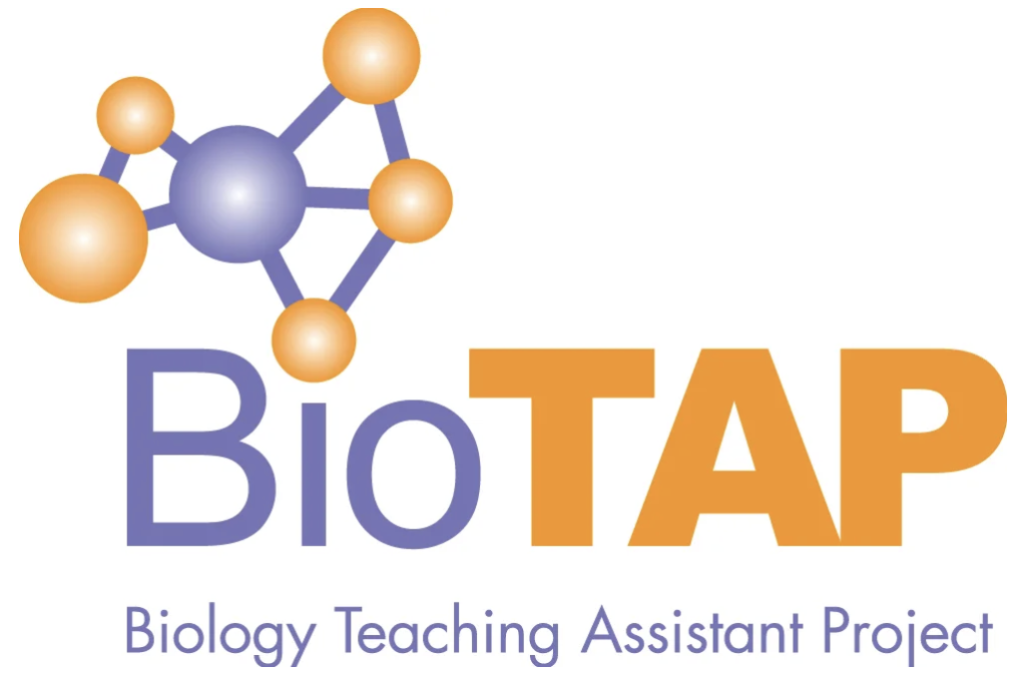
This page serves as an introduction to the TPD Catalyst – an exciting resource under development as part of the Evolving the Culture of Biology program (ECB).
Here is an outline (with quick links) of page sections:
- TPD Catalyst: Overview and Structure
- Authorship, Attribution, and Sharing of Resources
- Submission Options and Author Guidelines
- Evaluation Criteria and Reviewer Information
- Examples and Early Resources
TPD CATALYST: OVERVIEW AND STRUCTURE
The TPD Catalyst will be a living repository of TPD information, resources, and curriculum for individuals and institutions to use in their Teaching Professional Development programs for Teaching Assistants (TA-TPD). Enzymes like DNA polymerase beta (in the logo) are catalysts that lower the “activation energy” necessary for a chemical reaction to go forward. In that same spirit, the TPD Catalyst is meant to help lower the energy investment required of individuals seeking to support TAs in their teaching and professional development, to make it more likely that a disciplinary transformation and widespread adoption of TA-TPD can take place.
This resource will be created via collaboration between the Evolving the Culture of Biology leadership team, several cohorts of ECB Scholars, and eventually the broader BioTAP network of TPD providers and Catalyst users.
Check out this talk from the 2023 BioTAP Conference if you’d like a multimedia version of this overview that summarizes the long-term vision for the TPD Catalyst.

The TPD Catalyst will consist of the following components:
- Introduction. Key Information about TPD programs (e.g., various models, evidence for effectiveness, benefits of TPD for TAs and undergraduates, etc.)
- Topic Index. Expandable hierarchy of TPD Topics and corresponding Learning Outcomes to serve as the foundation for backward design
- Curriculum Modules. Activities and formative assessments aligned to each LO (per TPD Topic) which can be used individually and/or assembled into larger curricula for TPD programming that fits each user’s needs and context
- TPD Assignments. Assessments for TAs in more extensive TPD experiences (e.g. formal courses) with full assignment descriptions and rubrics
- Evidence-based Teaching (EBT) Resources. Insights and strategies rooted in inclusive and evidence-based teaching (aligned to TPD topics), to be used in TPD activities and/or provided directly to TAs for their reference
The guiding values of the TPD Catalyst are for it to be:
- A micro-modular suite of backward-designed TPD resources. Content and activities will be aligned to a single learning outcome from the Topic Index; these will generally be brief in nature as they work towards a specific, actionable, TA-centered outcome within a broader TPD topic. This way, users can efficiently assemble a TPD experience that best fits their own goals, TA population, format, timing, and other contextual considerations.
- A host to rigorous TPD experiences that foster inclusive and evidence-based practices. All submissions will be peer-reviewed by fellow TPD practitioners from the BioTAP network (and beyond). Curricula and resources will be held to high standards, as will the facilitator notes that set other TPD practitioners up for success as they prepare to implement the curriculum.
- A hyper-efficient process for disseminating effective TPD. The micro-modular structure means that publishing TPD pieces you’re particularly proud of is not overly cumbersome, and the author guidelines and review criteria have been streamlined as much as possible to maximize alignment, clarity, and rigor – while maintaining efficiency.
AUTHORSHIP, ATTRIBUTION, and SHARING OF RESOURCES

In leveraging our shared experience and expertise to build this resource, we also want to acknowledge the hard work and intellectual property contributed by ECB Scholars and members of the TPD community. To do this…
Entries will be clearly attributed to authors, and we intend for TPD Catalyst resources to be citable in ways that are analogous to other recognized forms of scholarship. Given the goal of disseminating effective TA-TPD practices, resources will be made available to users through a Creative Commons license (CC BY-NC-SA; link), as a way of striking the balance between acknowledging author contributions while ensuring free and widespread use. If you have questions, concerns, or insights about contributions and recognition of TPD Catalyst materials, please reach out to ECB leadership.
SUBMISSION OPTIONS and AUTHOR GUIDELINES
There will be multiple ways that authors can submit content to the TPD Catalyst:
- Curriculum Module. Teachable units for TPD programming, created through backward design and aligned to an outcome from the Topic Index. Modules will contain presentation slides (or other necessary resources), at least one formative assessment for TAs to apply their learning, and detailed notes to set facilitators up for success.
- TPD Assignment. Formal assessment options for TAs to complete as a part of a TPD experience. Assignments will include an overview for facilitators, complete instructions for TAs to complete the experience(s), and a rubric with detailed evaluation criteria (for TAs and TPD facilitators alike).
- Evidence-based Teaching (EBT) Resource. Resources with tried-and-true advice about specific teaching issues and topics. These can be provided to TAs for additional support, or used as a starting point for TPD curricula (e.g. an active and collaborative learning task based around the resource).
Detailed author guidelines for each option are coming soon!
EVALUATION CRITERIA and REVIEWER INFORMATION
See this guide for an overview of the review process for Editors and Reviewers, along with full evaluation criteria for reviewers and authors alike!
EXAMPLES and EARLY RESOURCES
- TPD Topics and Aligned Learning Outcomes
- Topic Index (start here for backward design of TPD materials)
- Option 1: Curriculum Module
- Option 2: TPD Assignments
- Option 3: Evidence-based Teaching Resources
- Several examples coming soon!
© 2024 All rights reserved. BioTAP Network.
